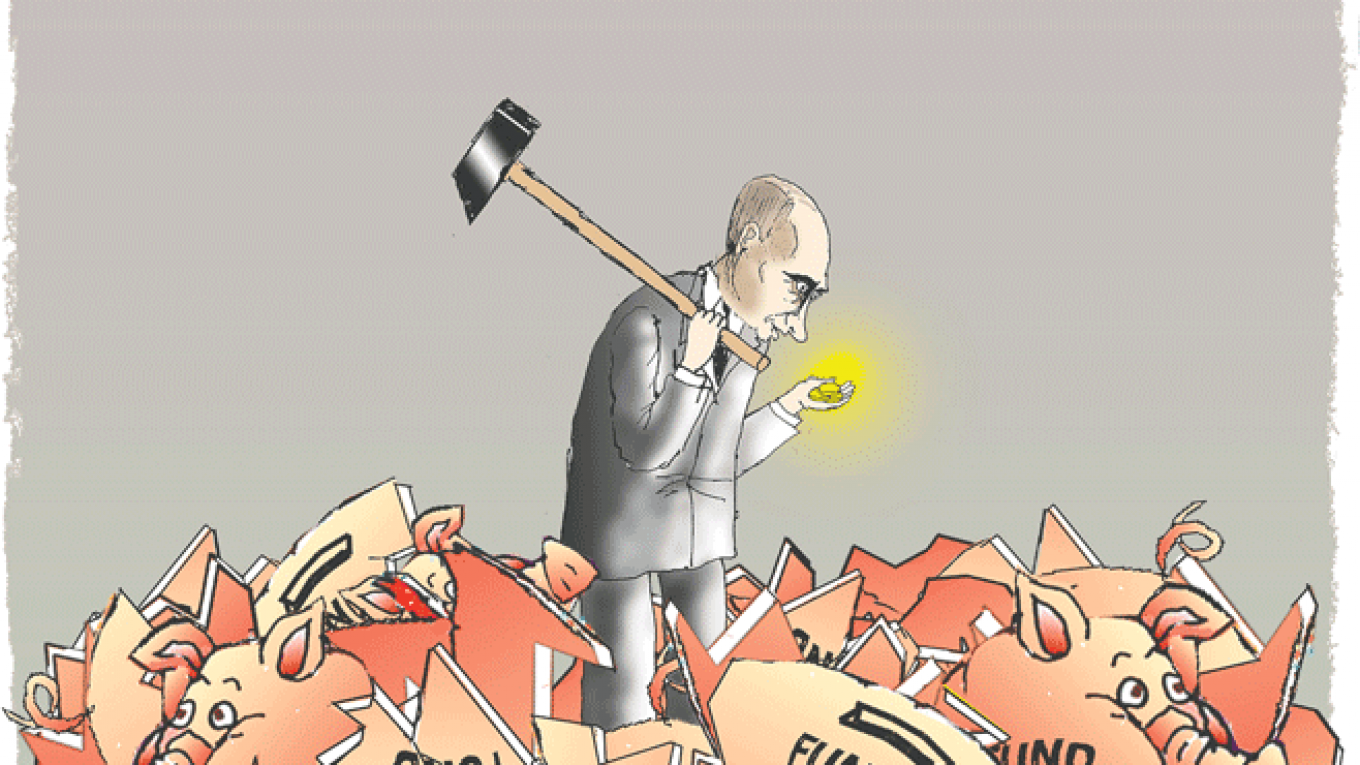Russian Finance Minister Anton Siluanov raised quite of lot of eyebrows last week when he stated that the government would withhold $8.2 billion worth of money that was originally scheduled to be invested in the pension system. A large chunk of this money will be set aside to create a special "reserve fund" designed to offer financing to state-owned companies that have been frozen out of Western capital markets as a result of increasingly severe U.S. and EU sanctions.
Less than a week earlier, Economic Development Minister Alexei Ulyukayev made a less detailed but potentially even bolder announcement that the Russian government will use "all means" to support companies that have been hit by Western sanctions. Unlike Siluanov, Ulyukayev didn't put a specific price tag on this support, but he did speculate on the sources of money, which include the National Wealth Fund and the state budget itself.
In one sense, the hundred billion rubles (roughly $2.6 billion) that has already been earmarked for aiding Rosneft, Sberbank and the other large state-owned companies is money that is not being invested in transport infrastructure, medical care or any one of a dozen other sectors in which Russia desperately needs to invest.
Rather than long-term improvements to Russia's economic competitiveness, this money will be spent, in business parlance, "just to keep the lights on." There are many potential uses of the money accumulated in Russia's sovereign wealth fund, but until recently no one would have argued that underwriting Rosneft's operating expenses should be one of them.
The aid being offered to companies hints at a much deeper issue: that of short- versus long-term priorities. Under Putin, the Russian government has often been caricatured, unfairly I think, as a bunch of people with no long-term plans. In many analysts' view, the essence of Putinism is that it is a series of short-term tactical improvisations masquerading as policy.
But in a broad sense, much of Russian economic policy has actually been focused on the very long term. If Putin was only thinking about the next six months, he never would have assented to the initial creation of the reserve fund or to the early pay down of Russia's sovereign debts: He would simply have spent all of the oil surplus in much the same way that former Venezuelan leader Hugo Chavez did.
Instead, over the past decade and a half Russia's fiscal policy has been one of the most prudent in the entire world. No other large country has a level of government debt that is as paltry as Russia's, and even as the economy has slowed over the past two years the government has constructed responsible budgets and run exceedingly modest deficits.
Unfortunately, though, U.S. and EU sanctions seem to be driving Russian policy making in a direction that is ever more focused on the short term over the long term. Capital flight, always a problem even during the best of times, has exploded to truly epidemic proportions. Investment has also been on a worrying downward trajectory. Sanctions, in short, seem to be drawing out the very worst parts of Russia's economy: the problems (especially inflation) have all grown more severe and the upsides have grown more muted.
Russia has sufficient resources at its disposal so that it can deal without Western financing, at least for a little while. Precise estimates differ, but there is general agreement that Russia will be able keep its largest companies operating without outside financing for at least two years.
There will, however, be serious costs associated with pursuing such a course, and the costs will grow exponentially more severe the longer they are incurred.
As just one example, consider pensions. Due to demographic changes that have seen the number of young adults halved, one of two things will happen: Russia's pension system will need a lot more money, or pensions will become a lot less generous. There is simply no other way to make the math work. Maybe there is a better example of the tension between the short and long terms, but I can't think of a more illustrative example than raiding the pension fund to give a bunch of money to Rosneft.
Russia can get away with such short-term-focused policies for a while. As Adam Smith noted, there is a lot of ruin in a nation, and even with all of the mounting difficulties Russia will likely find a way to stumble through. But in mounting such a panicky and reactive response to U.S. and EU sanctions, Russia is setting itself up for some really serious difficulty a few years down the line.
A Message from The Moscow Times:
Dear readers,
We are facing unprecedented challenges. Russia's Prosecutor General's Office has designated The Moscow Times as an "undesirable" organization, criminalizing our work and putting our staff at risk of prosecution. This follows our earlier unjust labeling as a "foreign agent."
These actions are direct attempts to silence independent journalism in Russia. The authorities claim our work "discredits the decisions of the Russian leadership." We see things differently: we strive to provide accurate, unbiased reporting on Russia.
We, the journalists of The Moscow Times, refuse to be silenced. But to continue our work, we need your help.
Your support, no matter how small, makes a world of difference. If you can, please support us monthly starting from just $2. It's quick to set up, and every contribution makes a significant impact.
By supporting The Moscow Times, you're defending open, independent journalism in the face of repression. Thank you for standing with us.
Remind me later.






